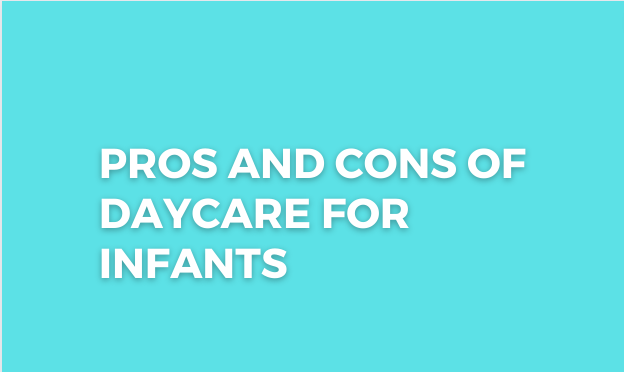Daycare for infants is a childcare option that provides supervision, social interaction, and early learning opportunities for young children. In the following list, we will explore pros and cons of daycare for infants, covering the advantages in terms of child development, socialization, convenience, and parental peace of mind, as well as the potential drawbacks and considerations associated with this type of childcare.
Pros:
- Socialization: Infants in daycare have opportunities to interact with their peers, fostering social skills and emotional development.
- Structured Learning: Daycare programs often incorporate age-appropriate activities and learning experiences to support early childhood development.
- Qualified Caregivers: Daycares employ trained professionals who have experience and knowledge in caring for infants.
- Convenience: Daycare provides a convenient option for working parents, allowing them to pursue their careers while ensuring their child’s well-being.
- Established Routine: Daycare centers typically follow a structured schedule, providing a consistent routine for infants.
- Early Education: Infants in daycare can benefit from early educational experiences, such as sensory stimulation, language development, and cognitive activities.
- Developmental Milestones: Daycare professionals can monitor and support infants in reaching important developmental milestones.
- Health and Safety: Daycares maintain strict health and safety protocols to ensure a clean and secure environment for infants.
- Exposure to Diversity: Daycare exposes infants to a diverse group of caregivers and peers, promoting cultural awareness and tolerance.
- Parental Peace of Mind: Knowing that their child is in a safe and nurturing environment, parents can focus on their work with peace of mind.
- Collaborative Play: Infants in daycare learn to engage in collaborative play with other children, fostering teamwork and cooperation.
- Language Development: Daycare environments often provide ample opportunities for language exposure and development through interactions with caregivers and peers.
- Physical Activity: Daycare centers may offer age-appropriate physical activities that promote gross motor skill development in infants.
- Stimulation and Engagement: Daycare settings provide a stimulating environment with toys, games, and activities to engage infants’ senses and curiosity.
- Transition to School: Daycare can help ease the transition to formal schooling by familiarizing infants with structured settings and routines.
- Support for Working Parents: Daycare allows working parents to balance their professional and family responsibilities effectively.
- Parental Support: Daycare centers often offer resources and guidance to parents, providing support in their parenting journey.
- Peer Interaction: Infants in daycare have the opportunity to interact and build relationships with peers, enhancing their social skills.
- Early Detection of Developmental Issues: Daycare professionals may identify potential developmental issues in infants, allowing for early intervention and support.
- Engaging Activities: Daycare centers provide a range of age-appropriate activities that promote learning and engagement in infants.
Cons:
- Separation Anxiety: Infants may experience separation anxiety when leaving their parents, leading to initial distress during daycare drop-offs.
- Increased Exposure to Illnesses: Being in close contact with other children in daycare can increase the likelihood of infants getting exposed to common illnesses.
- Limited Individual Attention: Daycare settings may have multiple infants, limiting the amount of individual attention each child receives.
- Different Caregivers: Infants in daycare may have different caregivers throughout the day, which can impact their attachment and continuity of care.
- Adjustment Period: It may take time for infants to adjust to the new environment, routines, and caregivers in a daycare setting.
- Risk of Accidents: Despite safety measures, there is always a risk of accidents or injuries when multiple infants are in the same space.
- Limited Parental Control: Parents have less direct control over their child’s daily routines and activities in a daycare setting.
- Cost: Daycare expenses can be a financial burden for some families, especially if high-quality programs are preferred.
- Inflexible Schedule: Parents may need to adhere to the daycare’s operating hours, which may not align with their work schedules or personal preferences.
- Limited Personalized Care: Due to the number of infants in a daycare, individualized care may be challenging to provide.
- Potential Noise and Overstimulation: Daycare environments can be noisy and overstimulating for some infants, affecting their ability to rest or focus.
- Lack of Continuity: Infants may experience changes in caregivers or classmates as children come and go from the daycare.
- Cultural and Value Differences: Daycare centers may not align with specific cultural practices or values held by parents.
- Limited Control over Curriculum: Parents may have limited influence over the curriculum or teaching methods used in a daycare program.
- Transitions and Changes: Infants may need to transition to different rooms or age groups within the daycare as they grow, which can be unsettling.
- Mealtime Challenges: Infants may have specific dietary needs or feeding preferences that may be challenging to accommodate in a daycare setting.
- Emotional and Behavioral Challenges: Some infants may exhibit changes in behavior or emotional well-being when transitioning to daycare.
- Limited Outdoor Time: Daycare centers may have limited outdoor playtime, impacting infants’ exposure to nature and fresh air.
- Potential for Inconsistent Care: Not all daycare centers may provide consistent and nurturing care, leading to varying experiences for infants.
- Sick Child Policies: Daycare centers may have strict sick child policies that require parents to find alternative care when their child is unwell.
Pros
- Socialization
- Structured Learning
- Qualified Caregivers
- Convenience
- Established Routine
- Early Education
- Developmental Milestones
- Health and Safety
- Exposure to Diversity
- Parental Peace of Mind
- Collaborative Play
- Language Development
- Physical Activity
- Stimulation and Engagement
- Transition to School
- Support for Working Parents
- Parental Support
- Peer Interaction
- Early Detection of Developmental Issues
- Engaging Activities
Cons
- Separation Anxiety
- Increased Exposure to Illnesses
- Limited Individual Attention
- Different Caregivers
- Adjustment Period
- Risk of Accidents
- Limited Parental Control
- Cost
- Inflexible Schedule
- Limited Personalized Care
- Potential Noise and Overstimulation
- Lack of Continuity
- Cultural and Value Differences
- Limited Control over Curriculum
- Transitions and Changes
- Mealtime Challenges
- Emotional and Behavioral Challenges
- Limited Outdoor Time
- Potential for Inconsistent Care
- Sick Child Policies



